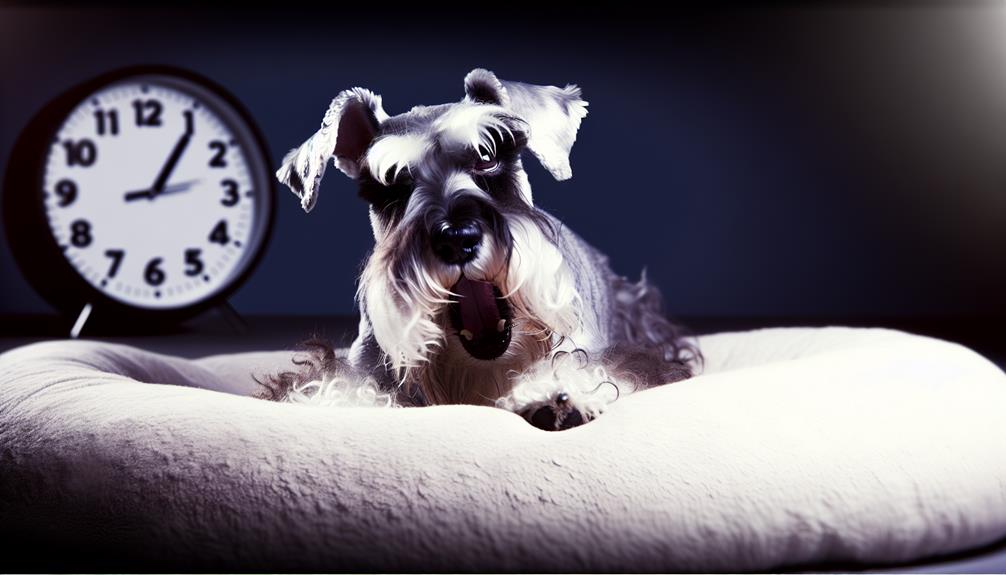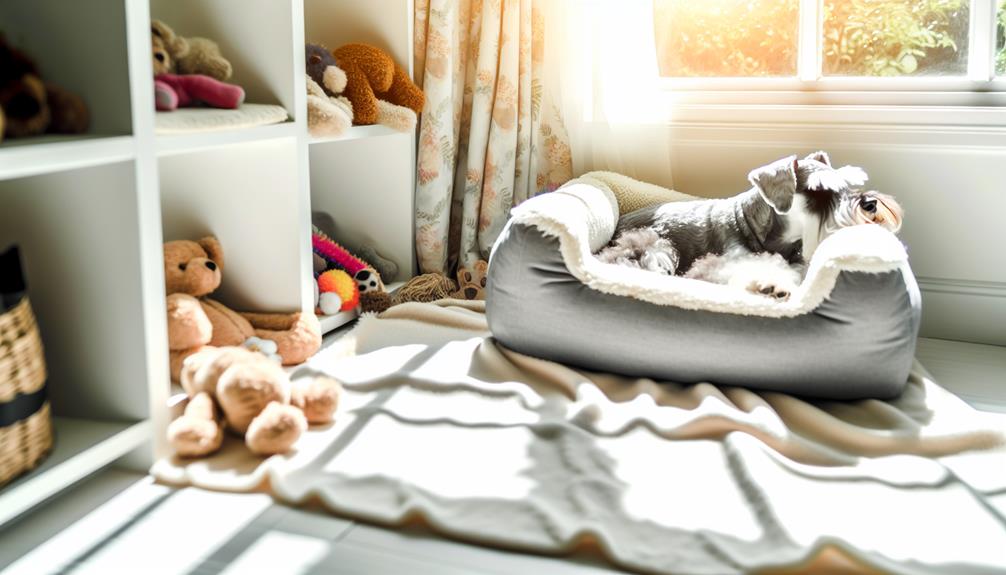Schnauzers do sleep a lot, typically between 12-14 hours a day.
Their sleep duration depends on age, health, and activity levels.
Puppies and seniors usually need more rest, while health conditions like arthritis can disrupt sleep patterns.
Regular observation of your Schnauzer’s sleep habits is important, as any significant changes might indicate underlying issues.
Creating a comfortable sleep environment and maintaining a consistent routine can enhance their sleep quality.
Ensuring your Schnauzer gets proper rest is essential for their overall health and well-being.
To learn more about managing their sleep patterns and potential issues, consider investigating further.
Do Schnauzers Sleep a Lot
Jump to a Specific Section
- 1 Key Takeaways
- 2 Understanding Schnauzer Sleep Patterns
- 3 The Importance of Sleep for Schnauzers
- 4 How Much Sleep Is Normal?
- 5 Do Schnauzers Sleep a Lot? Factors Influencing Sleep Duration
- 6 Signs of Sleep Deprivation
- 7 Creating a Restful Environment
- 8 The Best Beds for Schnauzers
- 9 Sleep and Schnauzer Health
- 10 Managing Sleep Disturbances
- 11 Tips for Better Sleep Hygiene
- 12 Frequently Asked Questions
- 13 Conclusion
Key Takeaways
- Schnauzers typically sleep 12-14 hours a day.
- Sleep duration is influenced by age, health, and activity level.
- Puppies and senior Schnauzers need more sleep than adults.
- Sleep is crucial for their physical health and mental well-being.
- Behavioral changes may indicate sleep disturbances.
Understanding Schnauzer Sleep Patterns
Understanding Schnauzer sleep patterns requires knowing they typically sleep 12-14 hours a day, influenced by factors like age, health, and activity level.
As your schnauzer ages, you’ll notice changes in their sleep duration.
Puppies and senior schnauzers often require more sleep compared to adults.
Health is another critical factor; any underlying medical conditions can greatly impact their sleep quality and duration.
Monitoring your schnauzer’s health closely will help you identify any disruptions in their sleep patterns.
Regular vet check-ups can make sure they remain in peak health, allowing for consistent sleep behavior.
Activity level plays an essential role in determining how much rest they need.
A schnauzer with a high activity level will require more sleep to recover and rejuvenate.
Behavioral changes can also indicate shifts in sleep patterns.
For instance, if your schnauzer becomes more lethargic or restless, it may signify a disruption in their regular sleep cycle.
Observing these patterns can provide valuable insights into their overall well-being.
By understanding these variables, you can better manage your schnauzer’s sleep environment, ensuring they get the rest they need for a healthy, balanced life.
The Importance of Sleep for Schnauzers
Adequate sleep is essential for Schnauzers to maintain their physical health, mental well-being, and overall quality of life.
Whether it’s a young puppy, an old Schnauzer, or a year-old neutered male mini Schnauzer, sleep plays a critical role in their daily routine.
Sufficient rest ensures that their bodies can heal, grow, and function at their best. Proper sleep supports cognitive function, which is crucial for training and behavioral stability.
For Schnauzers, the recommended 12-14 hours of sleep per day is not just a luxury but a necessity.
It leads to various issues, such as:
- Behavioral Problems: Lack of sleep can cause restlessness and irritability.
- Physical Health Issues: Inadequate sleep may weaken their immune system.
- Training Difficulties: Well-rested Schnauzers are more receptive to learning and commands.
- Overall Well-being: Proper sleep contributes to a balanced and happy demeanor.
It’s vital to provide a comfortable and quiet sleep environment.
This will help your Schnauzer achieve the quality rest they need.
If your Schnauzer is experiencing sleep issues, consulting a vet is recommended to rule out any underlying health concerns.
Quality sleep is a cornerstone of your Schnauzer’s health and happiness.
How Much Sleep Is Normal?

Mini Schnauzers generally need about 12-14 hours of sleep each day to maintain peak health.
This sleep duration is essential for their physical and mental well-being, helping them recharge and stay active during waking hours.
For a schnauzer puppy, especially during the initial weeks, sleep may extend beyond this range.
A week-old schnauzer puppy might sleep up to 20 hours a day as part of its rapid growth and development phase.
As schnauzers age, their sleep patterns will evolve. An old puppy, around six months, typically aligns more with the standard 12-14 hours of sleep, though variations can occur based on individual health and activity levels.
Regular sleep schedules are important, as disruptions can impact their overall demeanor and health.
It’s important to observe your schnauzer’s sleep habits closely.
Significant deviations from the normal sleep range could indicate underlying health issues or discomfort.
Providing a comfortable, quiet sleep environment can help make sure they get the rest they need.
By understanding these sleep requirements and patterns, you can better support your schnauzer’s health and well-being, making sure they remain happy and active companions.
Do Schnauzers Sleep a Lot? Factors Influencing Sleep Duration
Several factors can influence how much sleep your schnauzer gets each day.
Understanding these factors can help you make sure your pet is getting the rest they need to stay healthy and happy.
First, your schnauzer’s age plays an important role.
Health conditions also impact sleep duration.
Conditions like arthritis, heart problems, or metabolic disorders can cause your schnauzer to sleep more or have disrupted sleep patterns.
Additionally, activity level is a key factor.
More active dogs may need additional rest to recover from physical exertion.
Finally, individual differences among schnauzers can lead to variations in sleep duration, even among dogs of the same breed.
Here are some key factors that influence sleep duration in schnauzers:
- Age: Puppies and senior dogs often need more sleep.
- Health conditions: Issues like arthritis or heart problems can disrupt sleep.
- Activity level: More active dogs might require longer rest periods.
- Individual differences: Each schnauzer has unique sleep requirements.
Signs of Sleep Deprivation

When schnauzers don’t get enough sleep, they may show signs like excessive daytime sleepiness and restlessness during the night.
You might notice your schnauzer napping more than usual during the day, which can be a clear indicator of sleep deprivation.
Additionally, if your schnauzer is frequently waking up or moving around at night, this restlessness can suggest that they’re not getting the restorative sleep they need.
Snoring or irregular breathing patterns during sleep can also be a red flag.
These symptoms may point to underlying issues that are preventing your schnauzer from achieving deep, restful sleep.
It’s crucial to monitor these signs closely, as they can have a significant impact on your pet’s overall well-being.
Behavioral changes are another critical sign to watch for. Irritability, decreased activity, or a general change in demeanor can all be linked to insufficient sleep.
If your schnauzer is usually active and playful but suddenly seems lethargic or grumpy, sleep deprivation could be the culprit.
If you observe any of these signs and they persist, it’s advisable to consult a veterinarian.
Addressing sleep issues early can help ensure your schnauzer remains healthy and happy.
Creating a Restful Environment
Establishing a restful environment for your schnauzer guarantees they get the quality sleep necessary for their health and well-being.
To achieve this, you must consider several key factors that contribute to an ideal sleeping space for your pet.
First, make sure their sleeping area is quiet.
Schnauzers need a peaceful atmosphere to rest properly, free from loud noises and frequent disturbances.
By doing so, you help them feel secure and enable uninterrupted sleep.
Maintaining a comfortable temperature in the sleeping area is equally important. Schnauzers, like other dogs, are sensitive to extreme temperatures.
Keep their sleeping space at a moderate temperature to ensure they aren’t too hot or too cold.
Creating a designated sleeping spot for your schnauzer adds to their sense of security.
A specific place they can associate with rest helps them settle down more easily.
Lastly, consider using calming scents, such as lavender, to promote relaxation.
This can enhance your schnauzer’s sleep quality by creating a soothing environment.
- Make sure the area is quiet and free of disturbances
- Maintain a comfortable temperature
- Create a designated sleeping spot
- Use calming scents like lavender
The Best Beds for Schnauzers

Choosing the right bed for your Schnauzer is vital for ensuring their comfort and overall health during sleep.
With Schnauzers sleeping 12-14 hours a day, a quality bed provides the necessary support they need.
Opt for beds with adequate cushioning to support your Schnauzer’s joints and spine.
Orthopedic beds are especially beneficial for older dogs, as they help alleviate pressure on their joints, promoting better sleep and mobility.
Many Schnauzers also appreciate beds with raised edges.
These beds offer a sense of security, mimicking the feeling of being enclosed and protected.
When selecting a bed, consider the size and sleeping habits of your Schnauzer.
Make sure the bed allows them to stretch out fully or curl up comfortably.
It’s important to place the bed in a designated, quiet spot.
This reduces disturbances and helps your Schnauzer associate the area with rest.
Additionally, infusing the space with calming scents like lavender can further enhance relaxation.
By choosing the right bed and creating a serene sleeping environment, you’re helping your Schnauzer get the restorative sleep they need to stay healthy and happy.
Sleep and Schnauzer Health
Adequate sleep is pivotal for maintaining your Schnauzer’s physical and mental health.
Sleep allows your Schnauzer to recharge, supporting their immune system and overall well-being.
Without sufficient rest, your Schnauzer may exhibit behavioral issues, such as irritability or hyperactivity, which can affect their quality of life.
To support your Schnauzer’s health through proper sleep, consider the following:
- Comfortable Sleeping Environment: Guarantee your Schnauzer has a cozy bed in a quiet, low-traffic area to promote uninterrupted sleep.
- Consistent Sleep Schedule: Maintain a regular sleep routine to help your Schnauzer establish healthy sleep patterns.
- Health Monitoring: Changes in sleep habits, such as sleeping more or less than usual, can indicate health problems. Monitor these changes and consult your veterinarian if needed.
- Physical and Mental Exercise: Regular exercise and mental stimulation can help your Schnauzer sleep better by reducing anxiety and excess energy.
Managing Sleep Disturbances

While ensuring your Schnauzer gets enough sleep is vital, it’s equally important to address any sleep disturbances that may arise.
Monitoring your Schnauzer for signs of sleep issues, such as excessive daytime sleepiness, restlessness, or frequent waking, can help identify underlying problems.
Factors like age, health, and activity level can influence their sleep patterns.
If you notice any abnormalities, a visit to the vet is recommended to rule out medical conditions.
Creating a quiet and comfortable sleep environment is essential.
Ensure your Schnauzer has a designated sleeping spot with proper bedding.
This spot should be away from high-traffic areas to minimize disturbances.
A regular sleep routine can also help regulate their sleep habits.
Keeping the sleeping area dark and cool can further enhance their comfort.
If sleep disturbances persist, consider keeping a sleep diary to track patterns and pinpoint potential triggers.
This information can be invaluable during veterinary consultations.
By taking these steps, you can better manage your Schnauzer’s sleep disturbances and promote their overall well-being.
Remember, a rested Schnauzer is a happy and healthy companion.
Tips for Better Sleep Hygiene
To guarantee your Schnauzer gets the best rest possible, implement these essential sleep hygiene tips.
Quality sleep is vital for preventing behavioral issues and ensuring overall health.
Follow these guidelines to create an ideal sleep environment for your furry friend.
- Designate a Quiet Sleeping Area: Choose a spot that is away from household noise and frequent foot traffic. A quiet environment helps minimize disruptions and promotes uninterrupted rest.
- Provide a Comfortable Bed: Invest in a high-quality dog bed that supports your Schnauzer’s joints and provides adequate cushioning. A comfortable bed can greatly enhance their sleep quality.
- Maintain a Consistent Routine: Establish a regular schedule for feeding, playtime, and bedtime. Consistency helps regulate their internal clock and improves sleep patterns.
- Limit Stimulation Before Bed: Reduce activities that might overstimulate your Schnauzer before bedtime. Avoid vigorous play or feeding them large meals right before they settle down for the night.
If you notice signs of sleep issues, such as excessive daytime sleepiness or changes in behavior, consult a vet.
Persistent sleep problems may indicate underlying health concerns that require professional attention.
By following these tips, you can help ensure your Schnauzer gets the restful sleep they need.
Frequently Asked Questions
How Long Do Schnauzers Sleep a Day?
Think of a Schnauzer like a rechargeable battery. They typically sleep 12-14 hours a day, ensuring they recharge fully to maintain their health and well-being. Providing a cozy, quiet sleep environment is essential for their overall balance.
Why Does My Schnauzer Sleep So Much?
Your schnauzer sleeps so much because dogs typically need 12-14 hours of sleep daily. Factors like age, activity level, and health influence this. Make sure they have a cozy, quiet environment to support their physical and mental well-being.
Are Schnauzers Low Energy?
Schnauzers aren’t exactly couch potatoes, but they have moderate energy levels. They enjoy daily walks and playtime but don’t demand excessive exercise. Ensuring regular physical and mental stimulation helps keep them healthy and happy.
Do Schnauzers Get Bored?
Yes, Schnauzers get bored if they aren’t mentally stimulated. You should provide engaging activities like puzzle toys, obedience training, and regular exercise. A variety of toys and interactive play sessions can help prevent boredom effectively.
Conclusion
Ensuring your Schnauzer gets 12-14 hours of quality sleep daily is essential for their health and happiness.
Imagine Lucy, a Schnauzer who, after getting a cozy bed in a quiet corner, became more energetic and well-behaved.
By providing the right sleep environment, you can prevent behavioral issues and promote overall well-being.
Focus on creating a peaceful sleeping space, and you’ll see a positive change in your Schnauzer’s demeanor and vitality.
